Digital Dames

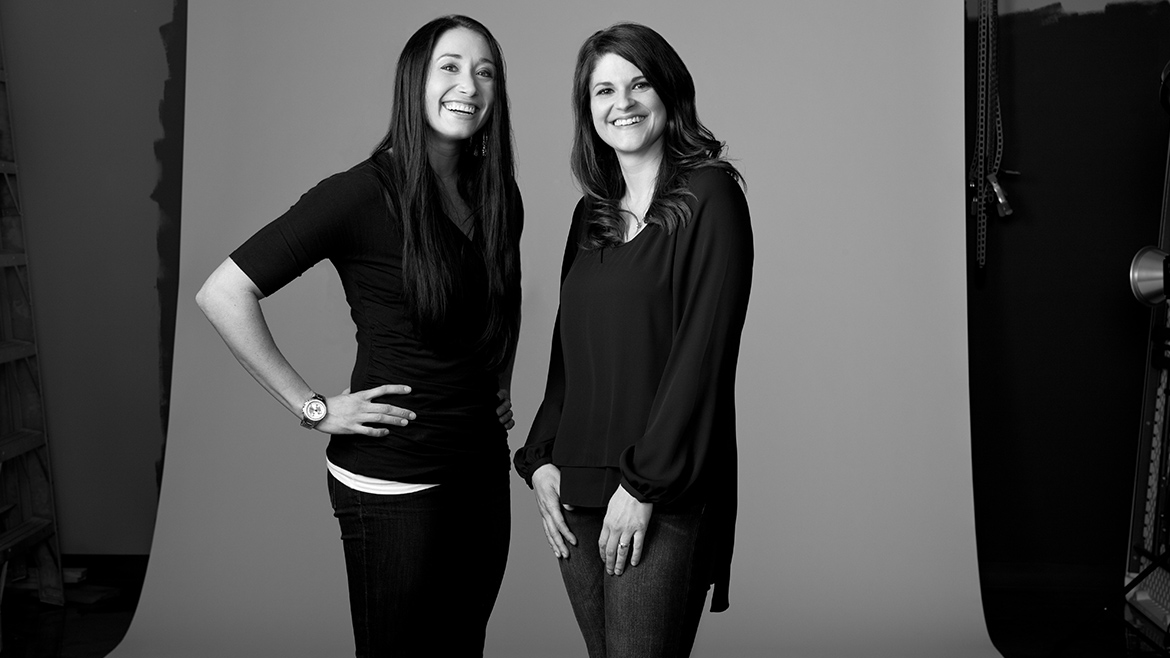
From interns to C-level execs before 30 at Division-D.
Lori Dillender and Katelyn Duff began internships that took them from students to the C-suite of small local startup before they turned 30. Within just years of graduating, they’re part owners of the multimillion-dollar venture Division-D and run the show as CEO and CRO, respectively. And their focus on giving opportunities to fresh college grads has them leading a new generation of employees to success in a digital media industry that never stops changing.
Homegrown Startup
The Columbia community has witnessed the success of local entrepreneur Bobby Campbell for years. Campbell’s projects have generated and sold for millions of dollars. His startup successes include digital media companies 3 Interactive (now Division-D) and AdKarma, and entertainment production company Good Wizard Productions.
Division-D has earned multiple Inc. 5000 nods for fast growth, growing by 85 percent between 2011 and 2014 and grossing $20 million in 2015. The Columbia-based business, which Campbell founded in 2003 out of the spare bedroom of his apartment, works by exclusively placing digital advertising with national and international brands. The staff of about 50 includes employees at satellite offices in Kansas City, Chicago, and Washington, D.C.
“Companies used to make their advertising budgets and allot a certain percentage for digital advertising,” says Campbell. “Things have changed. These days, advertisers and agencies make digital media the center of their budget and the center of their advertising world and the center of their efforts to reach their advertising goals.”
Being an early adopter of burgeoning trends in digital advertising enabled Campbell to build the company at an impressive pace. But, as an unapologetic member of Generation X who believes in being a “disruptor,” he has also been vocal about adopting a particular business philosophy.
“I personally love Millennials,” he says. “Millennials are uniquely adapted for the digital world.”
It’s no surprise, then, that Campbell placed Division-D in the hands of two such children of the ’80s, Dillender and Duff.
Lead(ing) Generation
St. Louis native Dillender, 29, and Kansas City native Duff, 28, have traveled similar roads to success. Their stories converge in Columbia, one year apart, as college freshmen pursuing degrees in strategic communication from the Missouri School of Journalism, and both graduated in 2009. Though in the same program at school, they didn’t meet until 3 Interactive (now Division-D) brought them together.
“I started with the company in 2008, while I was still in school — I saw an ad for an internship,” Dillender recalls of her junior year at MU. “Katelyn started as an intern in 2009, so I think I was starting full-time when she started interning. We have a very similar trajectory through the company because she started as an intern as well.”
Duff split her last year at MU between the 3 Interactive internship, working nights at Teller’s, and studying for her master’s in journalism. But a full-time career option at 3 Interactive trumped all, and Duff set grad school aside.
“I ended up really falling in love with [the company],” Duff says. “I interviewed at a couple of different places, got some offers in Chicago, but I rolled the dice really big and decided to stay at 3 Interactive. I couldn’t have made a better decision.”
In July 2010, just a few weeks after completing her internship, Duff started in an entry-level sales position at 3 Interactive. By the spring of 2012, she was named the director of strategic development. Nine months later, she was promoted to vice president of business development, and then to her current role as chief revenue officer in April 2014. She was 26.
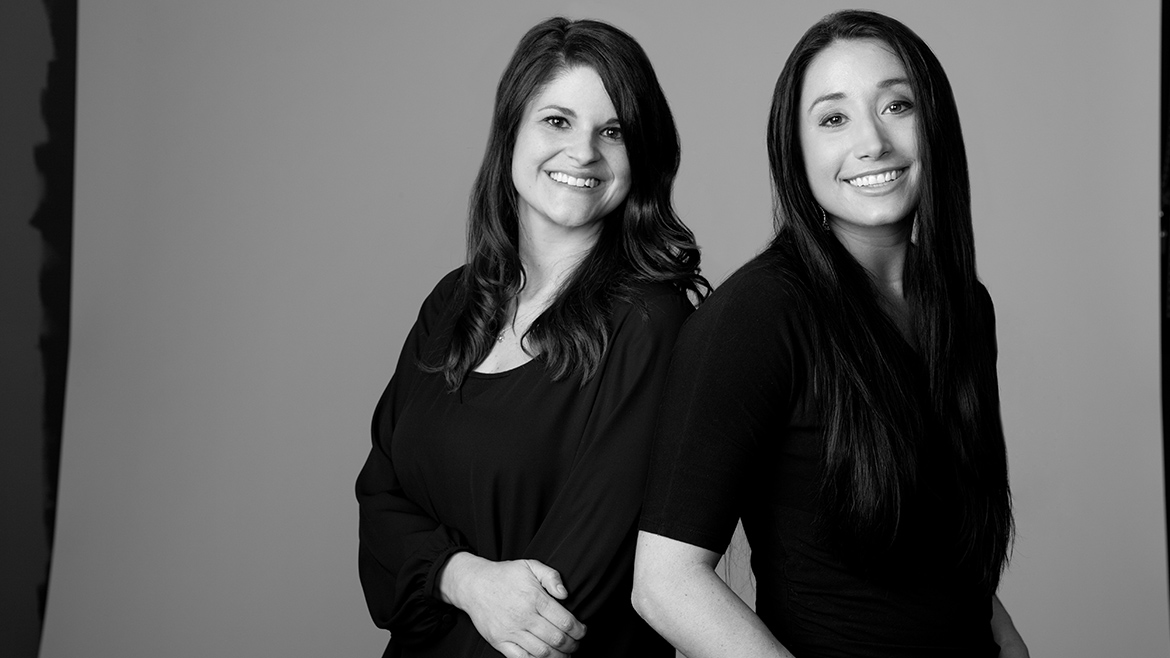
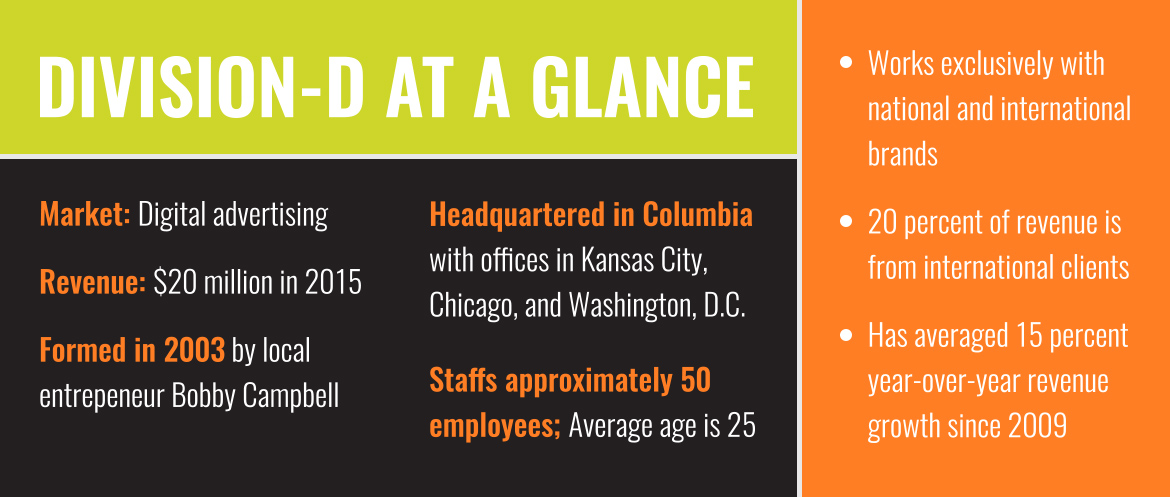
In the meantime, Dillender was climbing the ladder as well. Upon graduation, Dillender also started in sales, and it wasn’t long before she was promoted to director of sales, in 2009. By December 2012, at the age of 25, Dillender became vice president of operations. The following year, she became chief operating officer, and just 11 months later, she was named CEO.
Trendspotting
“In the simplest form, we work with brands and connect them with premium digital publishers,” Dillender says. “We place their ads online with different websites, and that’s kind of the biggest foundation for how we do business.”
In other words, Division-D acts as the bridge between website publishers looking to sell ad space and brands looking to place digital ads.
Dillender was VP of operations in late 2013, when the company rebranded from 3 Interactive to Division-D. Campbell, with the help of his young crew, had once again identified a new trend in the industry: dynamic, media-rich ad units designed to engage viewers and defeat “banner blindness.”
Static, banner-style display ads have appeared on websites for more than a decade and been successful, but consumers are growing increasingly immune to their presence. In 2011, industry-leading Interactive Ad Bureau released a portfolio of new ad formats called Rising Star. 3 Interactive was an early adopter of this portfolio and quickly became one of a few companies to offer it large-scale.
Designed to increase customer engagement, these formats make the whole webpage fair game for catchy, responsive display ads. With a mouse click, the ads expand, collapse, or animate. They come in a variety of sizes beyond the standard medium rectangle and often incorporate video content. These ads also use targeting and optimization methods of collecting information about online consumers, enabling the ads to change in real-time to provide content relevant to the customer.
Division-D is also in the business of video and mobile video advertising. Both are rapidly growing industries, with eMarketer predicting that video will account for nearly $10 billion in ad spending in 2016, and mobile video for nearly $7 billion by 2019.
“Video has become about a third of our business in the last two years,” says Dillender. “Video was about 10 percent of our business around 2014 and then grew to a third in just about a year.”
Getting in on the dynamic-ad-unit game spurred 3 Interactive to rebrand to Division-D, with the “D” standing for dynamic. Dillender and Duff have played active roles in that growth, as well as in feeding Campbell’s unique company culture.
Culture Counts
“One consistent I feel like we have is our vision to work hard, play hard. Hard work always pays off in the end,” says Janet Wilhelm, vice president of campaign operations. “The people who are going to find success here are very driven, smart, and hardworking.”
An employee since 2009, Wilhelm’s description of the staff reflects an intentional design in the company culture, one that rewards performance and attitude over experience. That’s because Campbell’s practice of hiring Millennials straight out of college has never changed. Average staff age is just 25, so experience isn’t expected.
Katelyn Duff

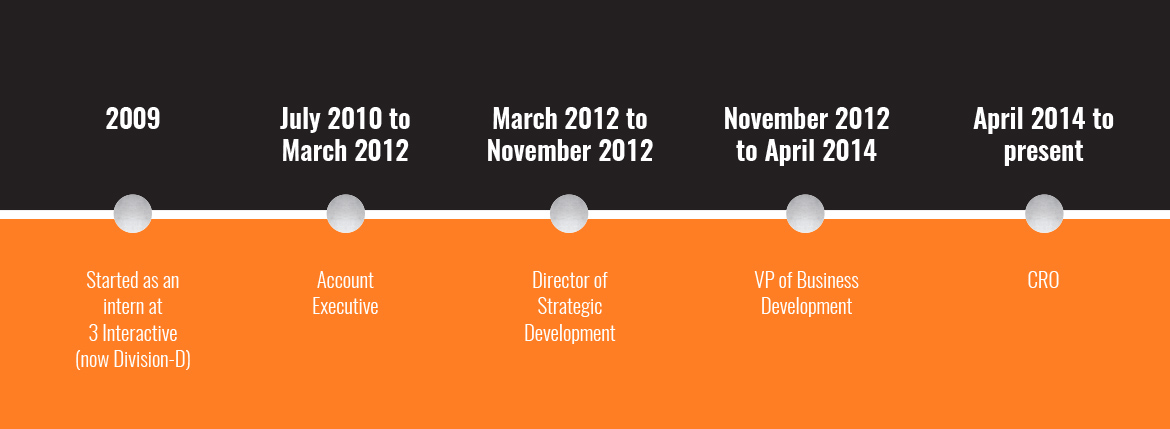
“We’ve had a lot of luck hiring right of school,” says Dillender. “They don’t necessarily have that professional experience, but we’re interested in the person. If they’re a hard worker with attitude and drive, we’re going to go ahead and hire them. We don’t require a certain amount of experience in the industry or anything like that. We’re looking at the person, the individual.”
Wilhelm feels that the credibility of the staff is not hindered by their age. Any doubt a client may have about working with young staffers quickly disappears once the business exchange begins and clients encounter competent and intelligent professionals.
A lengthy staff training program gives new employees a leg up on potential ageism. Once hired, Division-D employees enter six months of training to get them up to speed in the industry and ensure their success with the company. Each new member of the sales team gets a copy of Jeffrey Gitomer’s “Little Red Book of Selling: 12.5 Principles of Sales Greatness,” which Duff says covers sales fundamentals that match their business model.
Not to be discounted is Dillender and Duff’s management style. The two women work well together and take a hands-on approach with staff, with every staffer interacting with either Dillender or Duff on a daily basis. Their goal is to create an open environment where employees are encouraged to bring new ideas and strategies, which is important for innovation.
“The digital industry changes so much that if you get too stuck in your processes, the company will never grow,” Duff says. “We have to be willing to change and make decisions on the fly sometimes, because if you’re not keeping up with the digital landscape, you become stagnant.”
There is also a fun, laid-back environment focused on team building and friendly competition. Staffers enjoy “bring your dog to work” days, regular happy hours and potluck lunches, group fitness activities like kickboxing and CrossFit, and volunteering together in the community. Employees are also recognized in front of the staff and rewarded with “Pots of Gold” — cash bonuses or an extra day of vacation — for their achievements and good attitude.
“We definitely believe in creating a well-rounded, holistic work environment for employees where they can not only excel financially, but also find fulfilment socially,” says Duff.
The result is a whole new generation of young, modern, professional 20-somethings ready to show their stuff — and move up. And with Division-D’s policy of promoting from within, many employees are given the same opportunity as Dillender and Duff.
Digital Nation
Duff and her dog, Charlie, whom she adopted from the Central Missouri Humane Society, recently moved closer to home, setting up shop in the newly established Kansas City office that opened in February with a handful of employees from the Columbia office. The Washington, D.C. office also opened in February, fueled by the advertising demands of the upcoming elections, and the Chicago office opened last August. Dillender remains headquartered in Columbia.
Lori Dillender
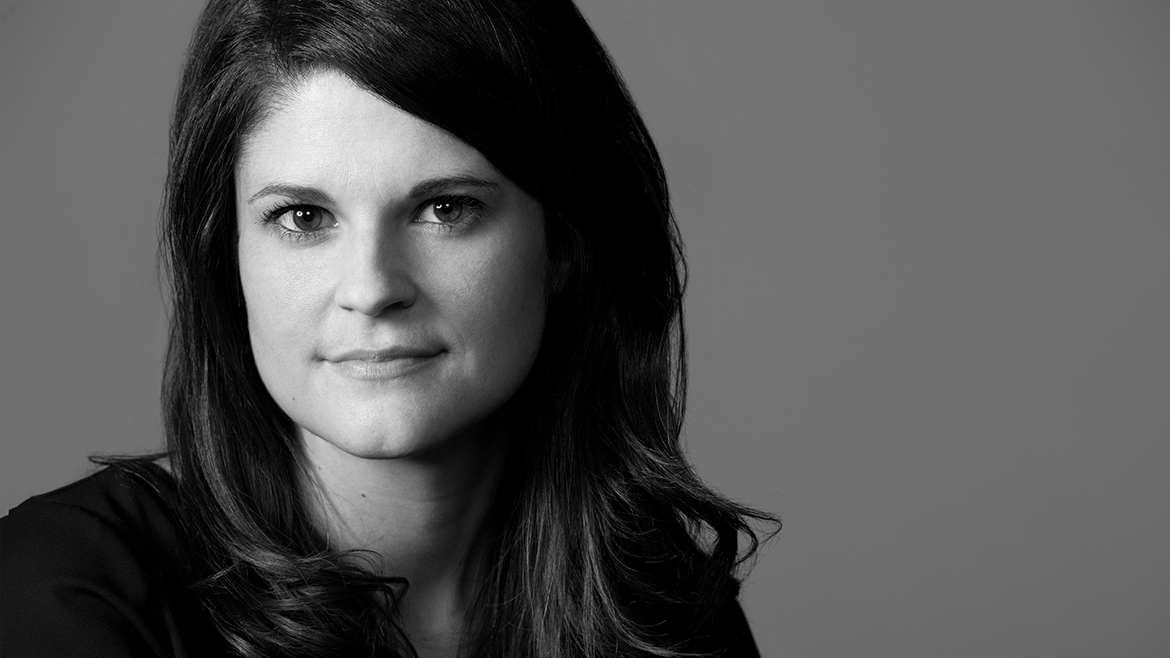
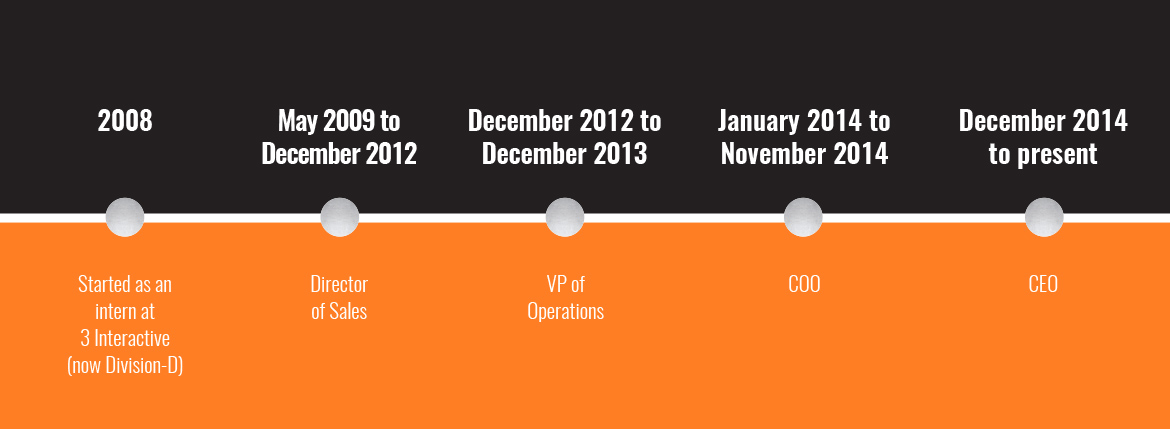
For Dillender and Duff, who are now part-owners in the company, their hope is to grow these offices, starting with Columbia staffers who want professional opportunities in bigger cities. But they have no plans for taking headquarters out of Columbia.
“Clients we talk to on the coast, in New York and Los Angeles, they’re not used to hearing from digital ad networks or companies in the heart of Missouri,” Dillender says. “They are very surprised that we’re operating here and are curious as to why we’ve stayed in Columbia. And the reason definitely behind that is the university. We rely very heavily on recruitment out of the journalism school and the talent out of Columbia.”
As they keep an eye out for the next hot trend in the ever-changing world of digital advertising, they feel confident that Division-D will persevere by maintaining a bootstrap mentality and continuing to invest in the next generation.
“We can give another young person that same opportunity, and that’s something that’s very important to Katie and me — helping our younger workforce right out of college to develop and grow,” Dillender says. “At the heart of it, that’s the most important part for us, helping individuals grow and reach their potential and personal goals.”


